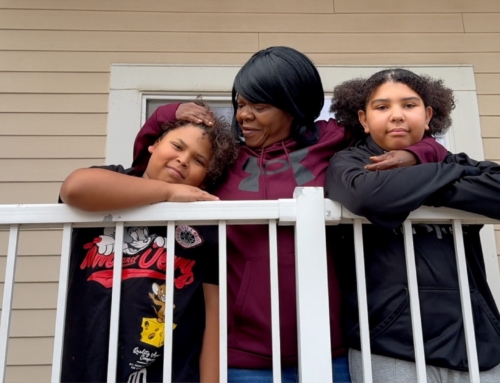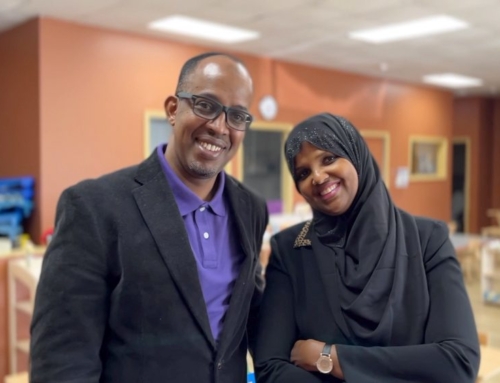Delivering safety & stability for 25 years
Twenty-five years at one organization is a rarity these days. But Emily Thompson says it has not seemed that long to her.
“Well, thinking about it being half the existence of the organization, it sounds kind of bizarre, but I’ve done three or four different jobs. So it doesn’t feel like I’ve been doing the same thing for 25 years.”
Emily started at 360 Communities as a domestic violence advocate at our Lewis House shelter. It was in that role that she honed her approach to the work.
Emily says the empathy she developed for domestic violence survivors helped her recognize what barriers might look like to a person in crisis. She walked alongside women experiencing a safety crisis, went to court with them, and helped them heal from trauma. She helped empower individuals to recognize their strengths and create a healthy future. For Emily, the work across 360 Communities shares common threads: building trust, helping people navigate barriers to success, and taking a strength-based approach.
Navigating barriers
“So it’s the barriers, such as domestic violence, mental health, or a financial crisis. You’re always kind of looking at it from a perspective of ‘how can I help them navigate these barriers?’”
Emily credits her background at Lewis House with preparing her for her next job as a home visitor with Dakota Healthy Families. There, she coached first-time parents, helping them support their children’s social, emotional, and cognitive development.
“One of the things we focused on in that program is being strength-based. All families have strength. Every person has strengths,” says Emily. “That was just a great way to be helpful with the family. If you are only focused on problems, that gets draining, and it’s not going to be as effective.”
Families typically spent four years in the program. Emily helped parents navigate challenges while recognizing their successes.
Today, Emily is a school-based family support worker in West St. Paul. She acts as a bridge of communication between home and school. She helps students and parents set goals for attendance, academic performance, safety, finances, housing stability, and much more. She connects families with stabilizing resources and helps ensure students stay on track in school.
Be helpful
Emily says that after 25 years, all of her experience has taught her to approach the work with one simple thought: “Be helpful.” This mantra may sound simple, but she says being helpful means different things at different times.
“Sometimes it’s saying something, and that’s it. Maybe it could be just listening and not saying anything or not trying to fix something,” says Emily. “Sometimes it means doing less. Sometimes it means doing more or doing different things for a family. So, it’s asking yourself what is helpful in that moment and for that family.”
Emily finds rewards and motivation in the success of the families and children she has supported over the years. She also says there has been something else that has been crucial to her longevity at 360 Communities.
“The other piece that I think is key to staying here is that I’ve had a good supervisor all along the way. That’s such a key in this kind of work. That’s why you can stay in crisis work,” she says, “I feel supported. I’ve had lots of different supervisors over the years, but that has always been a key to staying in this line of work. I feel really grateful about that.”
Rewards and longevity
Emily finds rewards and motivation in the success of the families and children she has supported over the years. She also says there has been something else that has been crucial to her longevity at 360 Communities.
“The other piece that I think is key to staying here is that I’ve had a good supervisor all along the way. That’s such a key in this kind of work. That’s why you can stay in crisis work,” she says, “I feel supported. I’ve had lots of different supervisors over the years, but that has always been a key to staying in this line of work. I feel really grateful about that.”








